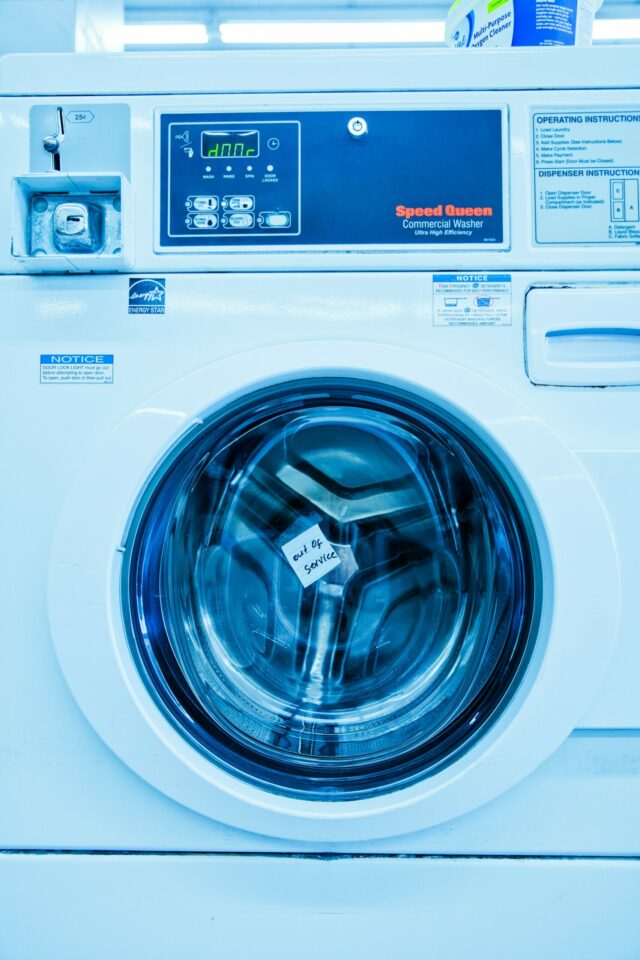If you’re a curious person then at some point you may have looked at a washing machine and asked yourself, “how does the lock work on a washing machine?” You’d be surprised at how many other people have wondered about that same thing, and also thought about how other parts of washers work.

So today we’re going to be answering that question, and diving into some facts about the mechanical workings of a washing machine lock. Let’s get started!
How Does The Lock Work On A Washing Machine?
| It honestly depends a lot on the make and model of each specific washing machine, so there’s no one answer. However, most washing machines use a bi-metal device in the door lock. One semi-popular alternative to that would be by using a pneumatic device instead. |
RELATED = = = > How Far Away Can A Washing Machine Be From The Drain
How Does A Bi-Metal Washing Machine Lock Work?
The bi-metal device will obviously be made of two different types of metal with differing properties. And the way a bi-metal based lock works is that when a washing machine door is closed an electrical coil, which is wrapped around the bi-metal device, will be powered by a connection within the lock.
This will heat up the metal, therefore making it bend and activating the lock. At this point, an electrical signal will pass to the rest of the machine so that it starts the cycle. After the cycle ends the power will be turned off and the metal will begin to cool. When a few minutes have passed, the metal will separate and unlock the door.
How Can You Tell If Your Washing Machine Has A Bi-Metal Lock?
One giveaway that your washing machine is using a bi-metal lock is if your washing machine signals to you that it’s done with the cycle but you can’t open the door right away. Because the metal hasn’t cooled enough. Although sometimes washing machines with a bi-metal lock will delay the finishing signal until the lock has cooled.
Another way to tell is if you’re looking at the actual lock. A bi-metal lock will look like a small plastic device with three simple wires attached to it.
RELATED = = = > Where Is The Best Place To Put Your Laundry Basket?
What Are The Other Types Of Washing Machine Locks?
As we mentioned earlier, a pneumatic (or air-controlled) lock is the second most common type used in washing machines. These types of locks detected water in the machine and would keep it locked until the water drained. But these aren’t nearly as popular as bi-metal locks because pneumatic locks cost a lot more money to produce.
Another older model of washing machine lock was a mixture of a pneumatic lock and a cable with a “pecker”. Essentially when the door lock was activated, the “pecker” would press down on the motor and start the machine. But these devices would normally end up burning out, so they’re not used anymore.
What Are Some Things That Can Go Wrong With Washing Machine Locks?
Every mechanical device can become faulty and need repairs. This goes for locks as well! So let’s take a look at a few common issues that can arise with washing machine locks.
- An Issue With The Wires – As is the case with all wires, they can overheat, burn, or become loose which can cause problems with the entire device.
- A Lack Of Power Going To The Lock – If connections go awry in another part of the machine, an adequate supply of power might not reach the lock. In this case, the door might not shut properly.
- Problems With The Coil – The electrical coil is an extremely important part of most washing machine locks, so if a coil opens or becomes faulty then it will probably need to be replaced.
Conclusion
If you’ve ever been curious about washing machine locks, especially if you’ve asked the question “how does the lock work on a washing machine”, then hopefully this article has satisfied that curiosity.
We tried to fill you in on everything you need to know about your washing machine lock, so that you understand a little better how everything works mechanically with your trusty washer!
READ ME NEXT = = = > Is a Square Shower Head Better Than Round?





